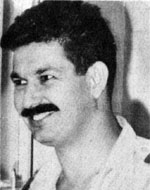Beit-On, Shlomo (Eliezer) (“Momik”)
Son of Nissim and Hannah. He was born on March 24, 1934 in Tel Aviv. He spent a pleasant childhood and in 1940 began his studies at the “Sample” elementary school. Without any special events, he spent his studies in the school during the Second World War, which left no impressions of Shlomo and did not interfere with his life as a child. During the years 1946-1948, the house was crowded with underground activities, because his two brothers were members of the Haganah and the tension at that time, on the occasion of the search for police in the house, and the adult conversations about the events were engraved in his memory. With the outbreak of the War of Independence in 1948, Shlomo graduated from elementary school. The tension in the house was great and the parents were worried about his two brothers and sister who went to military service. The economic problems also increased. Nevertheless, Shlomo was sent to continue his studies at the Montefiore vocational school, but he was forced to stop them and go out to work to help improve the situation at home. Finally he found a temporary job at a printing press and was out of school for a whole year. During this period he was a member of the United youth movement. Shlomo showed a special inclination to the work of thought that was expressed in the creation of wooden vessels and wooden furniture; The carving and painting, which he occasionally worked on, testified to his senses of beauty and aesthetics. After finishing his year of work, he returned to study in the evenings at the Oliphant school. After being drafted into the IDF in 1952, he underwent various courses and arrived at the pilots’ course, because he lived near the Tel Aviv airport (“Sde Dov”) and from day to day he aspired to be a pilot and serve in the Israel Air Force. He was in this corps for thirteen years, and anyone who knew him knew how to cherish his personality, and he identified with all the missions of the IDF and especially with the tasks of the air force. Nevertheless, he believed that the existence of the state would not be guaranteed only in the military territory. True to this view, he was always ready to exchange views on civil matters, which were a source of concern to him. In a balanced and settled mind he would discuss these questions. The innovations of science and technology were of great interest to him; He was aware of them and that was what promoted his military profession as well. Participated in the Sinai Campaign, was a pilot in the School of Flight and then was a squadron commander. In May 1957 he went to France as part of a training course for pilots, gained extensive experience and contacts with foreign pilots expanded his horizons both militarily and personally. About a year before the Six-Day War, he was promoted to the rank of lieutenant colonel and in his capacity as commander of an aviation squadron and deputy commander of the base was responsible for operating the aviation services at the base. On Sunday, June 9, 1967, the fifth day of the Six-Day War, Shlomo participated in an air strike on a Syrian position on the Golan Heights. He returned with the injured plane and abandoned it at a height of 50 feet about 4 km east of Kibbutz Lehavot Habashan, leaving a wife and two children to rest in the Kiryat Shaul military cemetery. By the Jewish National Fund in the Modi’in Forest near son of Shemen, and on the first anniversary of his death, his wife published a book in his memory entitled “Tekhelet VeArgaman”.
